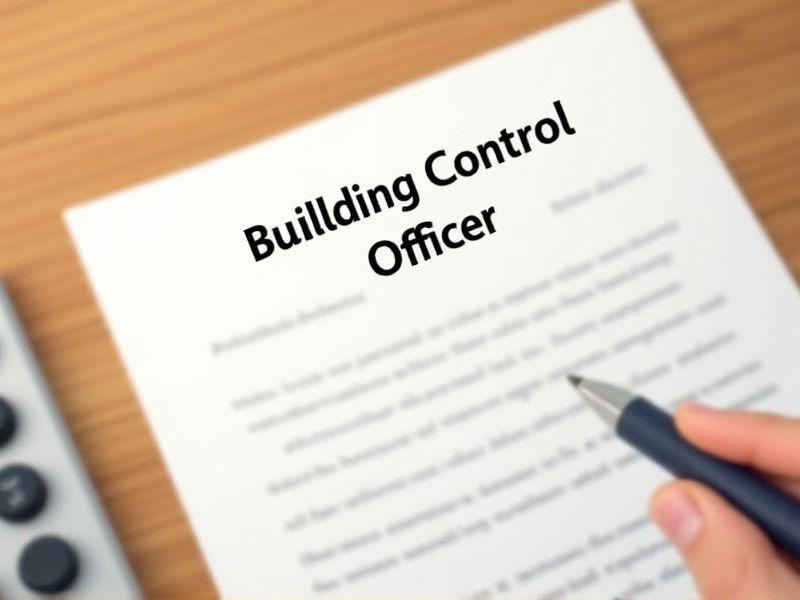
Building Control Officers play a critical role in ensuring that construction projects adhere to safety regulations and building codes. The complexity and technical nature of construction standards necessitate that these professionals possess specialized knowledge. Certain certifications equip them with the skills to assess structural integrity, enforce regulations, and manage compliance effectively. Some important certifications required for a Building Control Officer include those related to structural safety, environmental regulations, and energy efficiency assessments.
Building Regulations Compliance Certification
Building Regulations Compliance Certification ensures structures meet safety and quality standards, thus preventing potential hazards. It provides a clear benchmark for building control officers to assess and approve construction methods and materials. Having a compliance certificate streamlines the inspection process, facilitating timely project completions. It also instills confidence among stakeholders, including clients and insurers, in the building's adherence to legal standards.
Certified Building Control Officer
Certified Building Control Officers possess specialized knowledge in building codes and regulations, ensuring that construction projects adhere to legal and safety standards. Their certification indicates a recognized level of competence and expertise, reducing the risk of non-compliance and potential legal issues for construction projects. Trained professionals can efficiently identify and solve potential problems during the planning and construction phases, minimizing costly delays. The presence of a certified officer instills confidence among stakeholders, from architects to future occupants, about the safety and quality of the building project.
National Certificate in Building Control Practice
The National Certificate in Building Control Practice equips Building Control Officers with the necessary knowledge to ensure structures meet safety and compliance standards. Adequate training through this certification reduces the risk of structural failures and enhances public safety. It addresses the need for proficient skills in managing legal and technical aspects within construction projects. Employers gain confidence in hiring certified personnel who possess a standardized understanding of building regulations.
Certified Building Inspector
Building Control Officers rely on Certified Building Inspectors to ensure compliance with local and national building regulations, safeguarding public safety. Certified inspectors provide expert assessments that are crucial in identifying potential structural issues early, reducing the risk of future failures. Their experience and knowledge help streamline the building approval process, minimizing costly delays. By ensuring that construction standards are consistently met, certified inspectors contribute to maintaining the integrity and sustainability of the built environment.
Construction Project Management Professional Certification
The Construction Project Management Professional Certification equips a Building Control Officer with advanced project management skills, essential for effectively coordinating complex construction projects. It provides them with industry-recognized credentials, enhancing their credibility and authority within the construction sector. Certified officers gain a comprehensive understanding of compliance and safety standards, ensuring they can enforce regulations accurately. This certification also fosters improved communication and leadership abilities, which are crucial for managing diverse teams on construction sites.
Health and Safety in Construction Certification (e.g., NEBOSH)
The Health and Safety in Construction Certification equips Building Control Officers with fundamental knowledge to mitigate risks, ensuring site safety compliance. It provides the necessary skills to identify potential hazards, minimizing the likelihood of accidents. By understanding regulations, Building Control Officers can enforce safety standards effectively, resulting in reduced legal liabilities. When they hold such certification, the trust and credibility in their assessments increase, promoting safer construction environments.
Fire Safety Risk Assessment Certification
Fire Safety Risk Assessment Certification equips Building Control Officers with the necessary knowledge to identify potential fire hazards in structures. This certification ensures they can assess whether buildings comply with current safety regulations, reducing the likelihood of fires. By understanding fire dynamics and preventive measures, these officers play a crucial role in safeguarding occupants' lives. Their expertise in fire safety contributes to the overall resilience of the community against fire-related incidents.
Energy Efficiency and Sustainability Certification
Energy efficiency and sustainability certification equips building control officers with the knowledge to enforce regulations that minimize environmental impact. It enhances their ability to identify sustainable building practices, ensuring compliance with evolving energy codes. The certification aids in promoting public awareness about energy conservation and sustainable construction. It helps in reducing overall energy consumption and operational costs in the building sector, contributing to broader environmental goals.
Building Information Modeling (BIM) Certification
Building Information Modeling (BIM) Certification ensures a Building Control Officer possesses advanced skills in digital project management and design. Mastery in BIM enables accurate oversight of compliance with building codes and standards. Certified officers can more effectively collaborate with project teams, improving communication and reducing misunderstandings. BIM proficiency helps in identifying potential issues early, leading to safer construction practices and reduced costs.
LEED Accredited Professional Certification
The LEED Accredited Professional Certification provides Building Control Officers with a comprehensive understanding of sustainable building standards. Increased demand for energy-efficient and eco-friendly infrastructure creates a requirement for certified professionals who can guide projects towards these goals. Possessing this certification equips officers with the knowledge to influence key decision-making processes and ensure compliance with green building codes. The growing emphasis on sustainability in urban development makes this certification crucial for aligning with regulatory frameworks and industry trends.
Summary
By obtaining certifications, you enhance your credibility and expertise in building regulation and compliance. This increased competence can lead to more efficient project assessments and improved decision-making. Stakeholders may also gain greater confidence in your evaluations, potentially streamlining project approval processes. As a result, you might witness both career advancement and stronger professional reputation in the field.
